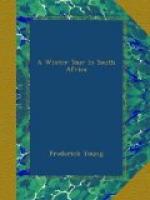and kindness from him during their visits to
the Old Country. Sir Frederick Young had very
kindly responded to the invitation of the committee
to lecture this evening, and though the subject
of Imperial Federation was of a somewhat political
nature, still it was not of such a character as to
preclude its being spoken about within the walls of
the association. The subject of the lecture
was one worthy of all attention, which had recently
been occupying the attention of eminent statesmen
of various political opinions. This was an age
of specialists, and he thought that Sir Frederick
Young might be well considered as a specialist
on the subject upon which he was now about to
address them. He had for many years been connected
with the Royal Colonial Institute, and his services
had received recognition at the hands of his
Sovereign.
Sir Frederick Young, who was most warmly received, said in he first place he must tender his hearty thanks to the Chairman for the very kind manner in which he had introduced him. The attention of the audience this evening would be directed to the desirability of promoting the unity of the British Empire. Before commencing his address, he wished to emphasize what the Chairman had already expressed with regard to the rules of the association on political subjects. In connection with that, he would say that the subject he was about to speak upon did not touch upon party politics in any way, as it was a National question, and might be excepted from their rigid rule. The subject of Imperial Federation was, to his mind, of so vast and vital a character, and of such importance to the whole nation collectively, that it impressed him with the responsibility he incurred in speaking upon it, and the feeling he had of being unable to do full justice to it. He spoke with some confidence on the subject, because he claimed to be one of the pioneers of the idea of Imperial Federation, which meant “the government of the Empire by the Empire.” He wished to take his hearers back to the origin of English parliaments, when the first idea of representation occurred to our early kings, and when the scattered portions of England were at last drawn into one focus of representation by Edward III., and gradually that kind of representation succeeded in effecting the Union of England and Scotland, and subsequently Ireland, things remaining in that form until the present day. Latterly, our Colonial Empire had grown up to wonderful and vast dimensions, but as far as the principle of representation was concerned there had been no great change, though it was perfectly true that during the past few years a certain number of the Colonies had obtained what was called self-government, or what he called the shadow of English government on the parliamentary system, as retained in its original principle and plan up to our own times. The Imperial policy of the British Empire was entirely conducted at Home, and Imperial Federation meant that this




